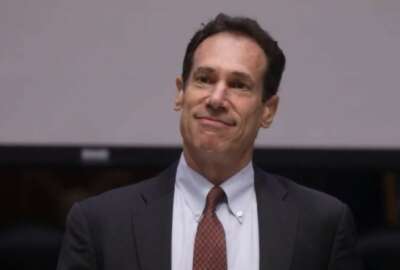
Many whistleblowers complain of retaliation to the Occupational Safety and Health Administration. But OSHA resolved only a tiny fraction of the retaliation...
Best listening experience is on Chrome, Firefox or Safari. Subscribe to Federal Drive’s daily audio interviews on Apple Podcasts or PodcastOne.
Since the advent of the pandemic, whistleblowers have called out employers throughout the country. Many of the whistleblowers complained of retaliation to the Occupational Safety and Health Administration. But OSHA resolved only a tiny fraction of the retaliation complaints, according to my our guest. For details, the director of the worker health and safety program at the National Employment Law Project, Debbie Berkowitz, joined Federal Drive with Tom Temin.
Interview transcript:
Tom Temin: Ms. Berkowitz, good to have you on.
Debbie Berkowitz: Thank you for having me on.
Tom Temin: Now, just to clarify, does OSHA also look into the actual complaints of pandemic related health issues or only the whistleblower complaints about it?
Debbie Berkowitz: OSHA actually does both. And on both fronts, they have completely failed. But workers have the right to file a complaint with OSHA alleging unsafe working conditions, and that the company is exposing them to serious physical harm, or death. And COVID-19, as we know, workplace exposures have been a main driver of the pandemic. And so, over in federal OSHA, over 9000 workers filed a complaint with federal OSHA to please come and inspect their workplace because of the workplace safety hazards relating to COVID-19. And the fact that the companies were making them work shoulder to shoulder or no hand sanitizer, no facemask and it was very unsafe. And OSHA responded to those complaints by essentially ignoring almost every single one of them, they simply just sent a letter to the employer saying we’re not inspecting in this pandemic, so you just investigate yourself. I think maybe they did 100-120-130 on site inspections, and really have had no impact on making the workplace safer. But in addition to that, workers who raise concerns who say to their company, listen, I don’t want to file an OSHA combine here, I just want a safe workplace and I can you tell me why I have to work shoulder to shoulder with somebody, or can I get a mask? Or I need to be able to wash my hands, and then get retaliated against that, get fired, or the company says go home for two weeks, you’re just you know, bothering me. Workers have the right to raise concerns in the workplace. And OSHA is supposed to make sure that they have that right. They’re called whistleblowers, but they’re filing. So if you’ve been retaliated against for raising concerns in the workplace, you have 30 days to file a complaint with federal OSHA, and that’s called a retaliation complaint. And even on with those complaints, where many workers have been fired and lost their jobs for raising legitimate concerns. OSHA has really done a dismal job of having workers back.
Tom Temin: And how are you able to arrive at these numbers?
Debbie Berkowitz: So OSHA, because it’s a press here, and I want to very grateful to the press filed lots of Freedom of Information requests with the agency for their data. OSHA is putting a lot of its data on its website on its Freedom of Information page. And so in early September, we saw an editorial or an op-ed by the head of OSHA under this administration that whistleblowers, listen, we have your back, we’re telling employers, they can’t retaliate, we will protect you. So we took a look at the data that OSHA had posted up to that point. And we actually printed out 90 pages of the data. So we had it right in front of us, that really showed that OSHA, in fact, was not protecting whistleblowers, over the half of the complaints that already been dismissed. At the time during the summer, OSHA also was lacking in staff. So it was taking a very long time for them to process complaints that they didn’t dismiss. And those that they didn’t dismiss only 35 of 1700. actually had they resolved. That’s 2%. That’s a really dismal track record. And we thought it was really important for workers to know that OSHA did not have their back and they shouldn’t be misled here. That just so they knew what their rights were.
Tom Temin: And what do we know about the nature of the companies? I mean, we heard a lot early in the pandemic about meat processing companies in the south having big problems, assembly, plants, factories in the Midwest. Do you know anything about the types of employers? Is there any pattern to where this type of activity happens?
Debbie Berkowitz: Well, we were able to, you could look at the website and you could see where these complaints were coming from and they were coming from all over. I have to say that I don’t think meatpacking and poultry workers file that many complaints because they are very scared. They’re very intimidated by their employers. But you saw they come from huge employers and small employers. So you saw they came from grocery stores and supermarkets and construction and home health care, a lot from healthcare a lot from nursing homes, couriers, warehouses. So it really was coming from all the essential workplaces that were out there, so and large and small.
Tom Temin: Basically, in other words, the types of employers where you cannot telework, because you have to be there physically, for some reason. Whereas all of the lobbyists and law firms and media and so forth, could easily work remotely and not have contact with one another.
Debbie Berkowitz: Exactly. That’s exactly right. So when I say it came from all the essential workers is the workers that were required to work outside their home, that really are the heroes in all this pandemic, which I think it’s dropped off the news right now because of the election. But listen, it’s it’s a huge risk for workers when they go to work. Over 1,000 people died on election day from COVID, 100,000 cases, and I’m still hearing from workers terrified, my coworker just got it and nobody’s telling me anything. So it’s not going away. And OSHA has an issued any specific requirements to that employers have to implement, which would have gone a long way to mitigating this crisis and mitigating the spread of COVID-19. But they didn’t. And now, they’re not really dealing with when workers complain. This administration really never had the back of workers. So I think we just have to keep looking at the data and keep holding the agency accountable. They have a mission, and they need to go back to what they’re supposed to be doing.
Tom Temin: Yeah, that’s my question. What can anyone do really about this? I guess, maybe file a class action suit, or our unions that have taken up the issue on behalf of members and companies that might be affected?
Debbie Berkowitz: So I think one thing that’ll be startling to a lot of your listeners is that workers have no right to sue on their own. Under the OSHA law workers, if OSHA decides not to inspect or have OSHA decides to dismiss your case on retaliation. That’s it. There is no right for an individual worker, or even a class of workers to get together and to under the OSHA law. It’s a very weak law. And so workers have very weak rights. And I do have to say that it is unions that has made all the difference in this pandemic, it is the nurses Union, the teachers union, the Service Employees Union, the United Food and Commercial Workers Union, the Auto Workers Union and the construction unions that have all demanded of their employers to provide certain protection. I mean, here in Washington DC, Giant and Safeway, big union workforce, the union demanded immediately masks and face shields and limiting customers and customers needed to be in masks and sanitizers and spreading checkers out six feet apart. That all happened because of the union and worker power, but there’s only 7% of the workforce is unionized in the country. So there are so many workplaces where workers are on their own. So I think it’s just important that we just keep doing these reports, keep holding the agency’s feet to the fire so that they return and start protecting workers. Right now, I was reading a quote from a worker advocate that really OSHA now is more interested in protecting employers from having to implement safety precautions than they are in protecting workers.
Tom Temin: Debbie Berkowitz is director of the worker health and safety program at the National Employment Law Project. Thanks so much for joining me.
Debbie Berkowitz: Oh, it’s great to be with you. Thank you so much.
Copyright © 2024 Federal News Network. All rights reserved. This website is not intended for users located within the European Economic Area.
Tom Temin is host of the Federal Drive and has been providing insight on federal technology and management issues for more than 30 years.
Follow @tteminWFED


